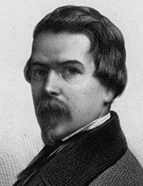

. He doesn't even try to conceal his presence. For this reason, an attentive reader like Capistrano de Abreu already warned us: "Varnhagen's temperament must be defined in order to properly understand his História geral [General History]", the "cyclopean mass of materials he had accumulated". ( Sobre o Visconde de Porto Seguro [About the Viscount of Porto Seguro], 1882, p. 441; Necrológio , 1878, p. 505).
Varnhagen was a monarchist. Yes, definitely. And in his own way, he was also a patriot. He was a Catholic,
as he never tired of saying. His belief, however, did not prevent him from ruthlessly criticising the Jesuits and, above all, the Inquisition. Self-centred and career-driven, though anachronistic in the given context, are not unreasonable characterisations. Ambitious? He even had an explanatory theory for his and other people's ambition. Anti-Indianist and Hobbesian are adjectives that perhaps fit him equally well, although he was a critic of Rousseau rather than a supporter of Hobbes. Anti-romantic? Certainly not at the beginning of his intellectual career. His relations with Alexandre Herculano, Almeida Garrett, and historians such as Cardinal Saraiva and Joaquim Heliodoro Cunha Rivara, director of the Évora Library, with whom he exchanged numerous letters, in addition to his collaboration with the Panorama and the Revista Universal Lisbonense, are sure indicators. Later, his critical stance towards the Indians of the Romanticism movement. Despite this, he seems to retain precepts of the romantic atmosphere, from, for example, the search for the original and the national to a passion for travelling. In addition, he maintained a close relationship with Brazilian and Portuguese men of letters through an intense correspondence until the end of his life, which did not necessarily break with the romantic conception of history and literature. Varnhagen is, above all, the author of an immense body of work that, although from a certain point onwards it favours history, crosses several domains, from Brazilian and Portuguese literature to literary criticism, biography, ethnology, politics and diplomacy, economics, architectural heritage, especially that of Portugal, and even philology. Various fields of knowledge written (in different languages) in roughly the same way: without style or elegance. It's almost a consensus that Varnhagen is not a good writer. Whether in history or any other genre. In this case, he faces the opposite dilemma to Michelet, who was accused, Roland Barthes reminds us, of being a bad historian because he wrote instead of simply redacting. Varnhagen did not write ; he redacted . This criticism arises more from a significant aporia in the historical culture of the 19th and early 20th centuries—its roots perhaps traceable to the Aristotelian principle of the superiority of poetry over history—than from any theoretical framework on how history ought to be written. Similarly, the IHGB, frequented by an abundance of literati, serves as a platform where the blurring of boundaries between the modern narrative—scientific, neutral, and objective—and the literary narrative—always influenced by the author's subjectivity—is also evident in the works of Alexandre Herculano, Almeida Garret, Oliveira Lima, and Tristão de Araripe, or even Capistrano de Abreu and José Veríssimo. No matter how much they strive to distance themselves from it, they remain immersed in the same regime of historicity as Varnhagen, leaving the matter unresolved and maintaining the value of the classic style as a significant attribute.
This work is financed by national funds through FCT - Foundation for Science and Technology, I.P, in the scope of the projects UIDB/04311/2020 and UIDP/04311/2020.
